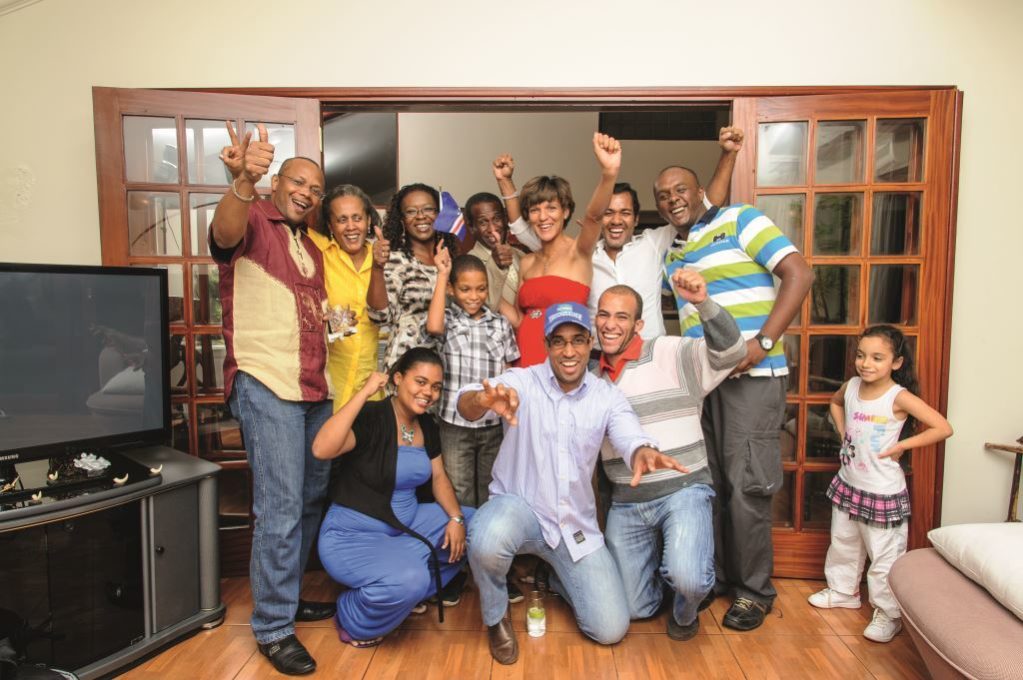It is a hot and noisy afternoon in a house in Maputo, Mozambique, where around 50 people are celebrating a birthday. Most have one thing in common: they hail from the islands of Cape Verde—a nation with a mere 500,000 people, fewer than Soweto in Johannesburg. They drink Grogue and Ponche the tipple of their ancestors. On the table is Queijo de Cabra (goat cheese) and doce de côco (coconut candy with sweet jelly).
Mozambique is home to around 1,500 people from Cape Verde. Many were born here after their parents fled hard times decades ago. In 2012, they have had something to shout about as their team qualified, against the odds, for the African Cup of Nations in South Africa in January.

The Royal Bafokeng Sports Palace. North West Province. South Africa.
One of the party-goers, Maria da Conceição Silva, came to Mozambique with her parents in 1948 when a drought in Cape Verde forced thousands to flee the island. Today she is the vice-president of the Associação Cabo-verdianos em Moçambique.
“The plan is to fill two machibombos [buses] with Cape Verdeans and friends of Cape Verdeans, and drive to the financial capital of South Africa,” she says.
“I did believe this would come one day and that it could have happened before, had it not been for the fact that many of Cape Verdeans’ sons living in Portugal choose to play for the Portuguese national team,” says another ex-patriate from Cape Verde.
The archipelago, just off the coast of Ghana, is made up of 10 islands. Most people live in the capital city, Praia. Cape Verde was ranked second in the Mo Ibrahim Index of African Governance, an indication that the islands are well-run; it is backed by high literacy levels of 70% across the population.
The national team is called the Tubaroes Azul—Blue Sharks—and is coached by Lúcio Antunes, an air traffic controller who has taken leave to coach the team. The team is ranked 51 on the FIFA rankings—above South Africa, Senegal, Cameroon and Morocco.
Ninety percent of the players play in the lower leagues of Europe. The star players are 22-year-old Ryan Mendes who is in the books of Lille OSC in France and veteran striker Lito, who is based at Portimonense, a second division side in Portugal.
In Cape Verde, football plays second fiddle to basketball. A mere handful of fans waited until the wee hours to welcome the team at Nelson Mandela International Airport, in Praia, after their victory in Cameroon.
Cape Verde is not the only surprise qualifier. Known more for their long-distance runners, the sleeping giants, Ethiopia, have made it back to the tournament after 30 years. Ethiopian Ambassador to South Africa, Yeshimebrat Mersha, believes the nation is on its way to reclaim their rightful place.

“Ethiopia was one of the strongest football nations previously. We are really happy that we are back on track. This is the result of the development plans by the government and good organization by the football federation,” Mersha says.
“We have high expectations for the cup and are ready for the matches. The fans are eager to watch the matches and some of them will travel from Ethiopia to support the team.”
Africa’s second most-populous nation, with 85 million people, had become conspicuous by its absence. Ethiopia was a founding member of the Nations Cup when they were part of the group of nations that formed the Confederation of African football (CAF) in 1957 in Khartoum, Sudan.
The Walya Antelopes are coached by Sewnet Bishaw and have two powerful strikers. Former Orlando Pirates player Fikru Tefera is a bustling striker any defender will struggle to handle. The man to watch is Saladin Seid, who scored the first goal in the final qualifier match against Sudan. He is currently in the books of Wadi Degla in the Egyptian Premier League who paid $200,000 for him.
Neither of the nations is expected to win the tournament ahead of the likes of Ghana, Nigeria, Morocco, Ivory Coast and defending champions Zambia. It will not be too much of a surprise if they cause an upset or two. After all, they did not make it to the continent’s premier football competition by sheer luck alone. Be afraid, be very afraid.

Stadium
